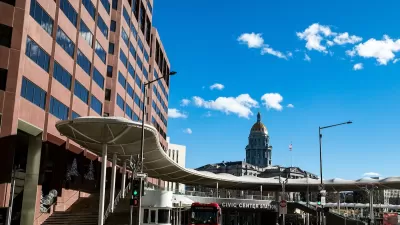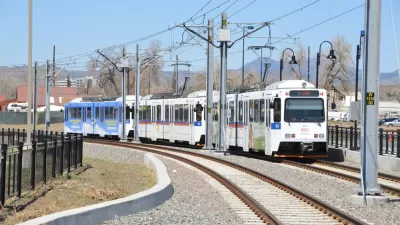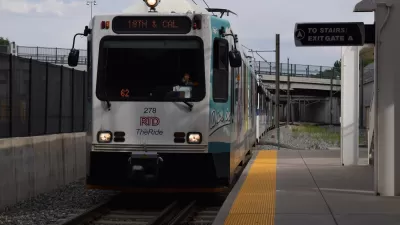The agency released a draft plan to eliminate regional zones, make airport trips more affordable, and reduce fares systemwide.

The Denver area Regional Transportation District (RTD) has unveiled a new draft plan for lowering fares, eliminating regional zones, and reducing the cost of monthly passes, reports Jon Murray in the Denver Post. The plan is based on the results of an “intensive systemwide study” undertaken by RTD in 2021. “The study’s mandate was to simplify RTD’s fare structure and reduce riders’ costs, which are at the upper end among U.S. transit agencies, especially for longer trips.”
Murray details the proposed changes, including lowering local fares and day pass fees, eliminating the regional fare, and reducing the cost of a monthly pass to $88, which would also include trips to the airport. The plan also suggests making fares free for youth under 19, increasing the low-income discount to 50 percent, and expanding its eligibility.
According to Murray, “More changes are possible, and RTD in the coming months will perform a federally required equity analysis to comply with civil rights laws.” The RTD board will vote on a final version in July, with new fares taking effect in early 2024.
The agency says it can afford the changes, since only 8 percent of operating expenses are covered by fare revenue, down from almost 16 percent before the Covid-19 pandemic. “The agency’s board briefing document projects that under the recommended fare and pass changes, revenue would drop next year to $73.5 million from $78.5 million, depending on whether the board approves a zero-fare youth pass pilot,” but ridership is expected to increase by 8 to 14 percent.
See the source article for more details on the proposed changes.
FULL STORY: RTD weighs cheaper fares and passes, with no regional zones — but airport trips still would cost much more

Planetizen Federal Action Tracker
A weekly monitor of how Trump’s orders and actions are impacting planners and planning in America.

San Francisco's School District Spent $105M To Build Affordable Housing for Teachers — And That's Just the Beginning
SFUSD joins a growing list of school districts using their land holdings to address housing affordability challenges faced by their own employees.

The Tiny, Adorable $7,000 Car Turning Japan Onto EVs
The single seat Mibot charges from a regular plug as quickly as an iPad, and is about half the price of an average EV.

Seattle's Plan for Adopting Driverless Cars
Equity, safety, accessibility and affordability are front of mind as the city prepares for robotaxis and other autonomous vehicles.

As Trump Phases Out FEMA, Is It Time to Flee the Floodplains?
With less federal funding available for disaster relief efforts, the need to relocate at-risk communities is more urgent than ever.

With Protected Lanes, 460% More People Commute by Bike
For those needing more ammo, more data proving what we already knew is here.
Urban Design for Planners 1: Software Tools
This six-course series explores essential urban design concepts using open source software and equips planners with the tools they need to participate fully in the urban design process.
Planning for Universal Design
Learn the tools for implementing Universal Design in planning regulations.
Smith Gee Studio
City of Charlotte
City of Camden Redevelopment Agency
City of Astoria
Transportation Research & Education Center (TREC) at Portland State University
US High Speed Rail Association
City of Camden Redevelopment Agency
Municipality of Princeton (NJ)





























